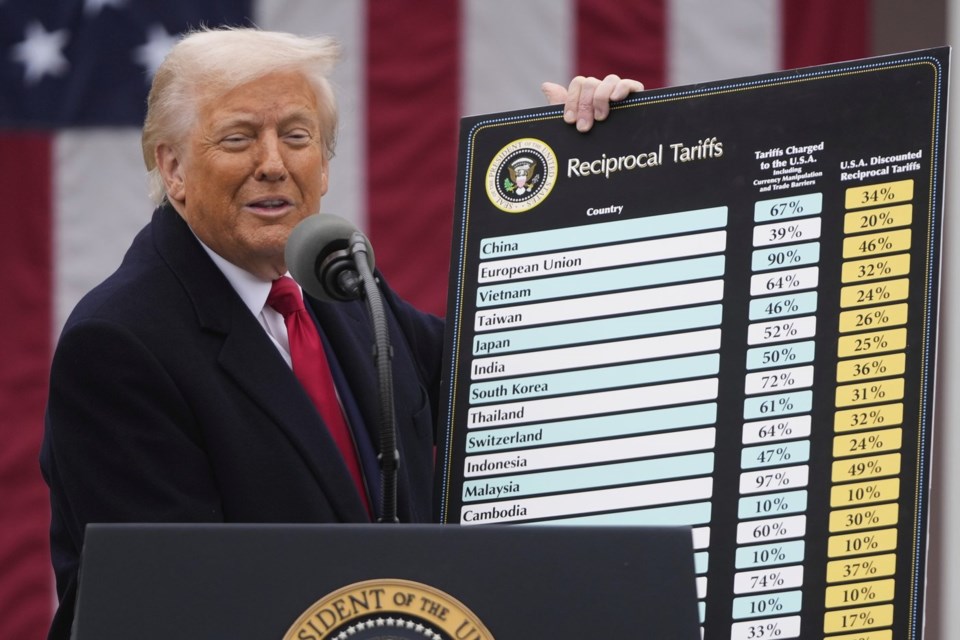WASHINGTON — U.S. President Donald Trump marked 200 days back in office on Wednesday by again hitting nations around the world with increased tariffs, days after slapping Canada with a 35 per cent duty.
"BILLIONS OF DOLLARS IN TARIFFS ARE NOW FLOWING INTO THE UNITED STATES OF AMERICA!" Trump posted on social media just after the duties came into effect.
Trump escalated his trade war last week by hitting Canada with a baseline 35 per cent tariff that applies only to goods not covered by the Canada-United States-Mexico Agreement on trade, better known as CUSMA.
Just after midnight on Thursday, U.S. tariffs on goods from more than 60 other nations and the European Union were increased. The duties range from a low of 10 per cent to 50 per cent for Brazil.
The EU, Japan and South Korea — which have brokered trade agreement frameworks with the Trump administration — saw tariffs increase to 15 per cent. Bangladesh and Vietnam were hit with 20 per cent duties. Switzerland saw its tariff increase to 39 per cent.
Nations are also being hit with Trump's separate tariffs on steel, aluminum, copper and automobiles.
"Tariffs are flowing into the USA at levels not thought even possible!" Trump posted on social media.
In fact, American tariffs are now at a level not seen in the U.S. in almost a century. The Budget Lab at Yale, a non-partisan policy research centre, has said Americans will see an average tax of 18.3 per cent on imported products, the highest rate since 1934.
Ontario Premier Doug Ford told media outlet CNN on Wednesday that "a tariff on Canada is a tax on the American people."
"This is hurting the American people," Ford said, adding that Canada and other countries are "diversifying our trade."
When asked how Canadians view Trump, Ford said he's "probably the most disliked politician in the world in Canada because he's attacked his closest family member, and that's the way we look on it."
"And when I talk to the governors, senators and congresspeople, even Republicans totally disagree, but they're too scared to come out and say anything because the president will go after them," he added.
Signs are emerging that Trump's tariffs are starting to drag down the American economy. After the release of a bleak jobs report last week, Trump fired the head of the agency that produces the monthly figures.
The U.S. Commerce Department said inflation was ticking slightly upward in June.
The greatest hurdle facing Trump's ongoing efforts to realign global trade may be the courts.
Last week, Trump's use of a national security statute for the so-called "Liberation Day" duties and fentanyl-related tariffs faced tough questions from federal appellate judges in the U.S. Court of Appeals for the Federal Circuit.
The judges asked the Trump administration's lawyer about the president's use of the International Economic Emergency Powers Act of 1977 to impose duties — despite the fact that the word "tariff" is found nowhere in the statute.
No decision was issued from the bench last week but the pending ruling was clearly weighing on the president just before his global tariffs came into place.
"THE ONLY THING THAT CAN STOP AMERICA’S GREATNESS WOULD BE A RADICAL LEFT COURT THAT WANTS TO SEE OUR COUNTRY FAIL!" Trump posted on social media just before midnight.
Conservative Leader Pierre Poilievre said Thursday that Canada should maintain targeted tariffs to pressure the Americans to "restore a true free-trading relationship."
"We need to narrowly target our counter-tariffs at things that maximize the impact on the Americans while minimizing impact on Canadians," he told a press conference in Calgary.
Prime Minister Mark Carney told reporters earlier this week that he might lift some counter-tariffs if that helps Canada in the ongoing trade dispute.
"We look at what we can do for our industry that's most effective. In some cases, that will be to remove tariffs," he said at a press conference in Kelowna on Tuesday.
The Liberal government's approach has divided the premiers. Ford has said Ottawa should hit back hard with counter-tariffs, while Saskatchewan Premier Scott Moe has called for easing retaliatory measures.
Poilievre slammed Carney for failing to get a deal by Trump's Aug. 1 deadline.
"He has made concession after concession to President Trump. He's been bending over backwards for the president and so far has gotten nothing in return," he said.
The Conservative leader pledged to introduce a bill in Parliament this fall to repeal a list of laws he said are blocking production and development. Poilievre will first have to win a seat in the House of Commons in an Aug. 18 byelection.
— With files from The Associated Press and Sarah Ritchie in Ottawa
This report by The Canadian Press was first published Aug. 7, 2025.
Kelly Geraldine Malone, The Canadian Press



